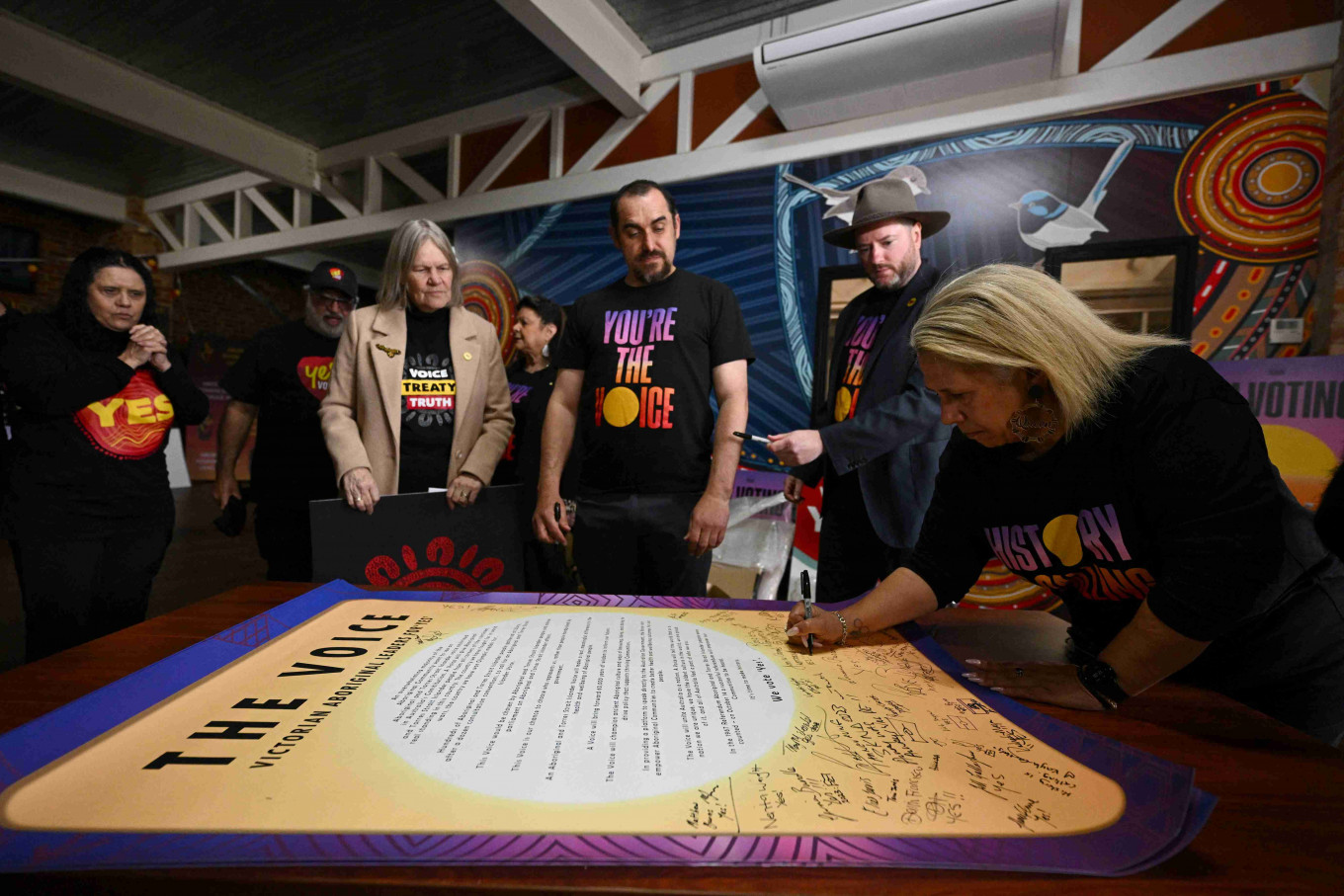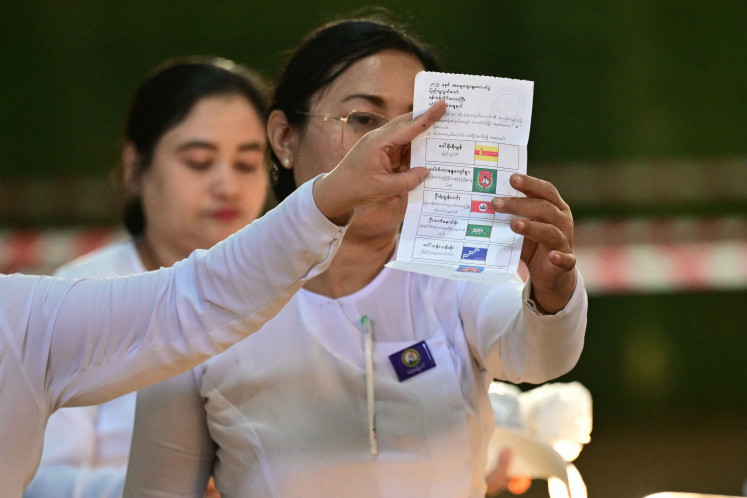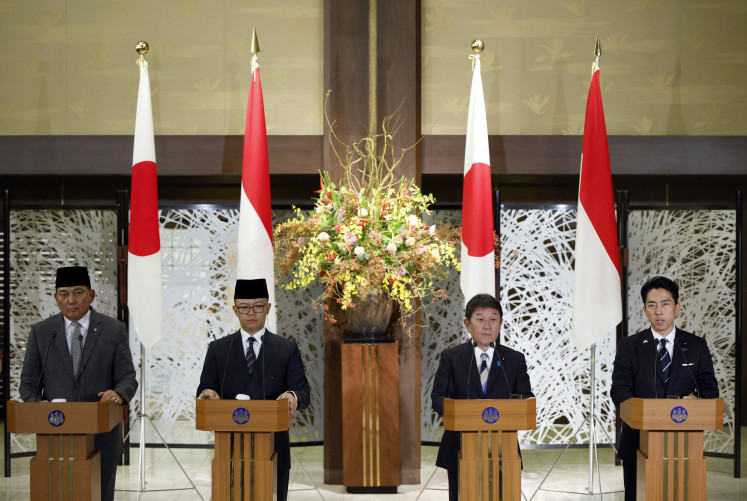Popular Reads
Top Results
Can't find what you're looking for?
View all search resultsPopular Reads
Top Results
Can't find what you're looking for?
View all search resultsAustralia staunchly defends Papua but is forgetful about Aborigines
Knowing that they often lecture other nations, including Indonesia, on democracy and human rights, it should not be difficult for the Australians to follow the New Zealand’s way, even if it may look humiliating.
Change text size
Gift Premium Articles
to Anyone
M
any Indonesians were probably surprised when 60 percent of eligible Australian voters said "No" in the Oct. 14 referendum to alter the constitution to create a Voice to Parliament to represent the indigenous Aborigine peoples. A nation that portrays itself as a noble defender, or even moral policeman, of human rights in Asia-Pacific shamelessly refused to practice what it has preached.
The Australians may need to recall what is written in the Holy Book now that they have repeatedly denied the rights of the indigenous people.
"Why do you look at the speck of sawdust in your brother's eye and pay no attention to the plank in your own eye? How can you say to your brother, 'Let me take the speck out of your eye,' when all the time there is a plank in your own eye?"
It was the second referendum on the same issue after the 1998 plebiscite, in which Australians voted against a constitutional amendment. It needs a national majority and majorities in at least four of the six states to win the referendum.
"This is a bitter irony," one of the indigenous leaders said. "That people who have only been on this continent for 235 years would refuse to recognize those whose home this land has been for 60,000 and more years is beyond reason," Reuters quoted the indigenous leader.
Australian Prime Minister Anthony Albanese accepted his share of the blame for the failure of a referendum question on indigenous recognition that could weaken his authority.
"We know that referendums are hard, that is why only eight of 45 have passed," Albanese said. "I certainly accept responsibility for the decisions that I have taken."
I think Maori people, who account for 15 percent of New Zealand's population, are much luckier than Aboriginal Australians. Like millions of people across the globe, I always feel amazed watching the All-Blacks rugby team, who always perform the famous Haka as a part of their pregame ritual.
It is always touching for New Zealanders, including their prime ministers, to perform the traditional Māori greeting, in which two people press their noses together, some including touching the foreheads at the same time.
Why is New Zealand different from Australia? Or why does Australia find it so difficult to learn from New Zealand? Knowing that they often lecture other nations, including Indonesia, on democracy and human rights, it should not be difficult for the Australians to follow New Zealand’s way, even if it may look humiliating.
For decades, even as the world community acknowledged Indonesia as the third-largest democracy after India and the United States, the Australian government, politicians, media, non-government organizations and academics still feel the need to criticize, if not condemn, Indonesia's human rights track record, especially in Papua.
What makes Australia upset with Indonesia is perhaps the undeniable fact that Indonesia is more important to Australia than the other way around. Both belong to the category of middle power. Still, in the eyes of many Indonesians, Australia is less important than other trade partners, despite its claim to be the deputy sheriff of the US in Asia-Pacific.
I must acknowledge that Australia’s criticisms of the way Indonesia treats Papua are not groundless. For decades Papua has remained marginalized, discriminated against and impoverished despite its huge natural resources. Resentment toward the central government has led to demands for independence and a separatist movement.
Australia has often received Papuan rebels as asylum seekers or refugees, based on humanitarian reasons. Indonesia has often expressed anger with Australia’s hospitality, although it would be better for Jakarta to reflect on why the Papuans feel restless in their own country.
The Human Rights Law Centre's director of communications, Tom Clarke, said the arrival of asylum seekers from Papua should remind Australia of the expectation to provide human rights leadership in the region.
"Reports of political assassinations, torture and the violent repression of peaceful political gatherings in Indonesia's Papuan provinces are all too common. Fundamental human rights are regularly violated. It's understandable that people will come to Australia seeking our protection," the human rights defender once said.
In my column in The Jakarta Post on Oct. 6, I wrote about how Indonesia and Australia split over the newly agreed Timor-Leste-China strategic partnership.
During his visit to China, Timor Leste Prime Minister Ramos Horta and Chinese President Xi Jinping agreed on the Comprehensive Strategic Partnership agreement between the two countries on Sept. 23.
Indonesia did not react, at least in public. By contrast, the Australian government and media openly expressed strong suspicions that Timor-Leste would follow in the footsteps of the Solomon Islands, which formed a military pact with China in July last year.
In my view, many in Australia have shared their frustration with smaller and ungrateful neighbors for choosing to play the China card to retaliate against their "blood-sucking colonial master".
"Imagine Chinese ghosts in Australia mainstream and rightwing media," Ramos Horta said. "Should we wear badges proclaiming our enduring love for Australia? But even then, would the overjealous Australian media stop accusing us, poor Timor-Leste, of being ungrateful [and] pro-China?"
Indonesia is the former colonial master of Timor-Leste. But why has Australia more often acted as a colonial master itself?
Indonesia has accepted Australia’s criticisms of human rights abuses in Papua, and in then East Timor. Now it is the turn of Indonesia to ask Australia,” Don’t you feel shame at the result of the referendum on the Aborigines?”
***
The writer is a senior editor at The Jakarta Post











